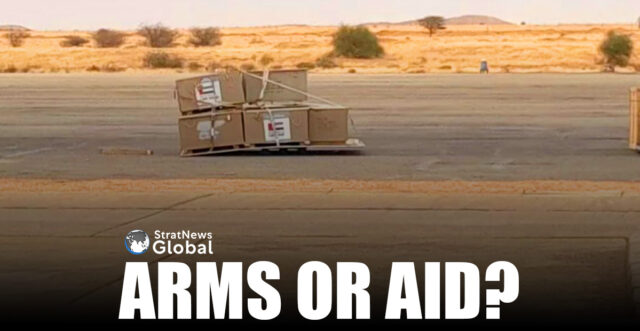Since the onset of Sudan’s civil war in April 2023, a steady stream of cargo planes from the United Arab Emirates (UAE) has landed at a remote airstrip in eastern Chad, fueling suspicions among U.N. experts and diplomats that the site is being used to transport weapons into the conflict zone.
Flight data and satellite imagery reviewed by Reuters reveal at least 86 flights from the UAE to Amdjarass, a small airstrip near the Sudanese border, with many linked to carriers previously accused of ferrying arms to warzones.
The UAE, a key Western ally, denies the allegations, asserting that the flights are part of a humanitarian mission providing food, medical supplies, and support for a field hospital in Amdjarass.
However, a U.N. report in January cited “credible” claims that Emirati weapons were being supplied to Sudan’s Rapid Support Forces (RSF), a paramilitary group fighting the Sudanese army.
Unreleased video footage reviewed by Reuters shows metal crates labeled with the UAE flag on the tarmac in Amdjarass. Weapons experts consulted by Reuters indicated the crates were unlikely to contain humanitarian aid, pointing to their size, weight, and proportions as consistent with ammunition and firearms.
Brigadier General Nabil Abdullah, a spokesperson for the Sudanese army, labeled the alleged arms transfers as a “tangible fact,” accusing the UAE of prolonging the conflict and exacerbating civilian casualties. The RSF denies receiving external support, claiming its resources are locally sourced.
The UAE government rejected these accusations in a statement to Reuters, asserting that it has conducted 159 relief flights delivering over 10,000 tonnes of aid to Sudanese refugees. The Emirates Red Crescent has treated more than 18,000 refugees at its field hospital in Amdjarass, according to the UAE.
The UAE has a history of involvement in regional conflicts, including in Yemen and Libya, where it has backed forces aligned with its strategic interests.
In Sudan, the RSF, which evolved from the Janjaweed militias active during the Darfur crisis, has leveraged its influence in western Sudan and neighboring Chad to gain ground in the ongoing civil war.
The Sudan Conflict Observatory, supported by the U.S. State Department, suggests that UAE-supplied weapons have tilted the balance of power in the RSF’s favor. “Logistics win wars, and the UAE has consistently facilitated weapons to the RSF,” said Justin Lynch, the observatory’s lead analyst.
At least four airlines involved in the Chad airlift have been linked to prior arms transfers, according to U.N. investigations. These include ZetAvia and FlySky Airlines, which were previously accused of transporting weapons to Libyan factions. Additional flights reportedly stopped in Kenya, Uganda, Rwanda, and Somaliland, raising further questions about the cargo’s true nature.
The U.S., Britain, and the African Union are closely monitoring the situation. While Washington has engaged the UAE in discussions, U.S. intelligence reportedly left little room for denials regarding the alleged arms transfers. A U.S. State Department spokesperson emphasized the dangers of supporting any belligerent parties in the conflict.
The conflict in Sudan has displaced millions and killed tens of thousands. Humanitarian groups and aid workers operating in Chad have cast doubt on the UAE’s claims of large-scale relief efforts, with some suggesting that the actual volume of aid delivered falls short of Emirati assertions.
The allegations against the UAE, coupled with evidence gathered by Reuters, underscore the complexities of Sudan’s civil war, where international actors continue to shape the trajectory of the conflict.
(REUTERS)
In a career spanning three decades and counting, Ramananda (Ram to his friends) has been the foreign editor of The Telegraph, Outlook Magazine and the New Indian Express. He helped set up rediff.com’s editorial operations in San Jose and New York, helmed sify.com, and was the founder editor of India.com.
His work has featured in national and international publications like the Al Jazeera Centre for Studies, Global Times and Ashahi Shimbun. But his one constant over all these years, he says, has been the attempt to understand rising India’s place in the world.
He can rustle up a mean salad, his oil-less pepper chicken is to die for, and all it takes is some beer and rhythm and blues to rock his soul.
Talk to him about foreign and strategic affairs, media, South Asia, China, and of course India.





